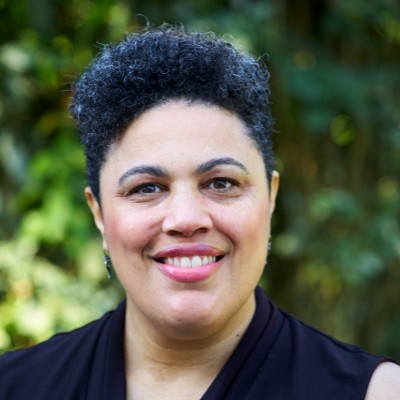An Alumna Uses Her Education To Implement Diversity, Equity and Inclusion Practices Across 50 L
/0x73:400x328/prod01/channel_34/media/alumni/images/suvoicealumniblog/DMyers-Headshot-2020.jpg)
In October, Dominica Myers '16, took on the newly created role of Director of Diversity, Equity and Inclusion (DEI) for the King County Library System (KCLS)&nb
 Dominica Myers, ’16, discusses her new role, what has shaped her personal experiences and professional trajectory and how her Master’s in Nonprofit Leadership (MNPL) from Seattle University has been instrumental in her career.
Dominica Myers, ’16, discusses her new role, what has shaped her personal experiences and professional trajectory and how her Master’s in Nonprofit Leadership (MNPL) from Seattle University has been instrumental in her career.
Your previous and current positions seem to center equity. Why did you choose to pursue these positions and how have you continued to learn and grow from them?
I don’t think my past positions necessarily centered equity. At least not to begin with. Centering equity is what I brought to the position because of who I am and what I stand for. As I made centering equity a priority in my job, the work and the position evolved in terms of leadership and visibility, especially after I graduated from the MNPL program. The equity work was desperately needed and I had a vision for it. I’ve been fortunate to have worked under and learned so much from some of the most dynamic and influential leaders in our region. Lynn Strickland, executive director at Aerospace Joint Apprenticeship Committee (AJAC), Maria Chavez Wilcox, CEO of YWCA Seattle/King/Snohomish County, and Aidan Lang and Christina Scheppelmann, general directors at Seattle Opera. Each of them allowed me to grow my leadership and really stretch myself in my role in their organizations. In my current role with KCLS, I am in a position where centering equity across a large system is literally my job. It’s exciting!
At Seattle U, social justice is central to our mission. Can you talk about your experiences with social justice as it relates to your professional career and service or some other aspect of your work?
I guess where it started was when I was 16 years old and I had the opportunity to volunteer in the baby room at my neighborhood Childhaven branch. I did that for two years until I was old enough at 18 to be a substitute teacher throughout my undergrad years and for a little while beyond. I worked with kids and families who had experienced horrible traumas and knew it was important work. I just saw it as the right thing to do and I loved it because I loved the kids. Since then, I’ve worked or volunteered in many roles over the years that might be considered ‘social justice work,’ but it never quite feels like I’m doing enough. The amount of injustice in the world can be overwhelming sometimes. Over time, I’ve learned how important it is to understand, address and dismantle the root causes of trauma and oppression, not just offer individual services. It’s where my heart is these days and I feel like I have a lot to discern. And a lot to do.
Tell us about your role as the Director of Diversity, Equity and Inclusion for the King County Library System.
The director of diversity, equity and inclusion position, as well as the DEI department, are brand new to the library system and I’ve received quite a warm welcome from staff. There are 50 libraries in 36 cities across King County, and over 1,000 employees. The scope covers a lot of diverse territory, communities and people. My role is to ensure that KCLS has shared language, understanding and practices in support of KCLS’s commitment to diversity, equity and inclusion consistent across all library system departments and locations. I’m only about a month and a half into the job, so I guess ask me again how it’s going in six months or a year.
How has your Seattle U education helped guide you in your professional journey or informed how you approach your work?
The master’s in Nonprofit Leadership (MNPL) program has been instrumental in my professional career growth. The comprehensive nature of the program really helped me to discover areas of strength that I otherwise may have never recognized or may have never become so influential in my work. At the same time, I deepened my knowledge in areas of the nonprofit world that I was already experienced and familiar with. As an example, I would imagine that some people might assume that as a woman of color and DEI director, the most important piece of my education for my role must have been the social justice class. But it wasn’t. Social justice was knowledge I brought with me to the program and have continued to acquire over a lifetime. The combination of three classes made all the difference for me professionally: Evaluation, Strategic Planning, and Organizational Change. Those are the three most imperative elements to the work I am charged with accomplishing at KCLS. The foundation, of course, is diversity, equity, and inclusion, but the work is accomplished through the tools of evaluation and strategic planning toward an outcome of transformational organizational change. I would never have been able to connect these dots without the skills, tools and concepts I learned through the MNPL program.
Do you have any advice or resources for other alumni looking to help advance equity and inclusion in their organizations?
There are people and organizations who have already been doing the work for some time, particularly folx and organizations from communities of color. Follow their lead. Listen and learn. Do so with genuine humility and mindfulness. I wish I had a lightening in a bottle answer to this, but the reality is that the work is work, and organizational change happens over time with consistency, intentionality and courage.
The Seattle University Alumni Association
December 2, 2020